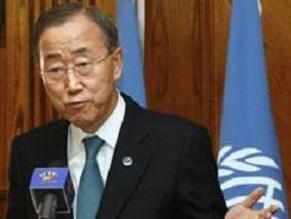|
World Jewish News

UN Secretary General Ban Ki-moon stressed the need for ''the Israeli government to take some goodwill gestures so that these meetings can continue. Of course this will also require the Palestinian authorities to come to the dialogue table.
|
UN leader calls for 'goodwill gestures' by Israel
02.02.2012, Israel and the World UN leader Ban Ki-moon called on Tuesday for "goodwill gestures" by Israel to encourage the Palestinians to revive the Middle East peace process, ahead of talks with leaders from the two sides.
Speaking after meeting with Jordanian leaders, Ban did not say what the gestures were, but he has been an outspoken critic of Israel's settlement in the West Bank, which the Palestinians blame for the latest peace impasse.
Ban held separate talks with Jordan's King Abdullah II and Foreign Minister Nasser Judeh before he goes on Wednesday to meet with Israel's Prime Minister Benjamin Netanyahu in Jerusalem and Palestinian president Mahmud Abbas in Ramallah.
He praised Jordan for hosting five sets of preliminary talks between Israeli and Palestinian negotiators this month.
"This momentum created after two years should be sustained," Ban told a press conference after his talks with Judeh.
"Both sides should return to the dialogue table with a sense of strong political will and courage," he added.
The UN secretary general stressed the need for "the Israeli government to take some goodwill gestures so that these meetings can continue. Of course this will also require the Palestinian authorities to come to the dialogue table.
"That is what I am going to discuss with Israeli leaders and Palestinian Authority leaders."
Direct talks have been frozen since September 2010, when the Palestinians pulled out after Israel's refusal to extend a moratorium on settlement building.
"The international community should intensify efforts to back peace efforts," the king told Ban, according to a palace statement.
"Jordan supports the revival of negotiations on final status issues, leading to the establishment of an independent Palestinian state."
The deadlock has also been increased by a Palestinian bid to gain international recognition elsewhere, including with an application for full UN membership.
No progress has been reported in the Amman contacts, but Ban's visit comes less than a week after EU foreign policy chief Catherine Ashton went to Jerusalem and Ramallah to press Netanyahu and Abbas to pursue the contacts.
The United States has also been putting pressure on the two sides, diplomats said.
"My visit comes at an important moment," Ban said last week when he announced the trip. "I will be there to encourage both sides to engage in earnest and create a positive atmosphere for moving forward."
Ban is also expected to meet Israeli President Shimon Peres and other top officials from both sides during his stay, UN officials said.
The United Nations, European Union, Russia and United States make up the diplomatic Quartet that has been trying to broker a Middle East peace deal.
The UN secretary general met with the Quartet envoy, former British premier Tony Blair, at the Davos forum in Switzerland last week, a UN spokesman said. Blair is believed to be back in Jerusalem.
Asked on Sunday about the prospects of renewed peace talks, Israeli Prime Minister Benjamin Netanyahu said: "The signs are not particularly propitious."
However, Israel says the Amman meetings should continue.
"Restarting the peace process is the best way for Israel to take advantage of the Arab Spring and the changes rocking the Middle East," President Peres said Tuesday in his address to the annual Herzliya Conference.
"The only way... is to reach an Israeli-Palestinian accord like we did with Egypt and Jordan. I say this because I believe an agreement is possible."
At the same Interdisciplinary Center (IDC) conference, Jordan’s Prince El Hassan bin Talal, the brother of Jordan’s late King Hussein and uncle of its current monarch Abdullah II, also called for a renewal of the peace process.
"Peace has never been an easy ride for any of us," he said, "But the comradeship between Muslims, Christians and Jews has existed for longer than has conflict."
The diplomatic Quartet called on October 26 for both sides to present comprehensive proposals on territory and security within three months, as a first step towards resuming direct talks.
EJP
|
|
